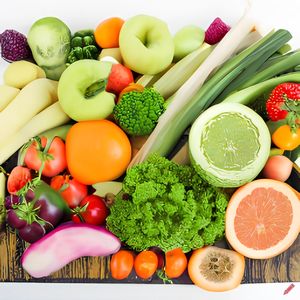The significance of healthy food in our lives cannot be overstated. It not only fuels our body and mind, but it also nourishes our soul. With the increasing awareness of the impact of diet on our overall well-being, it has become essential to delve deeper into the world of healthy food. This article will explore the benefits of a well-balanced diet, the role of essential nutrients in our daily lives, and provide tips for incorporating healthier food choices.
The Importance of a Balanced Diet
A balanced diet is the foundation of a healthy lifestyle. It provides the necessary energy for our bodies to function optimally, supports our immune system, and reduces the risk of chronic illnesses such as heart disease, diabetes, and obesity. A well-balanced diet consists of a variety of fruits, vegetables, whole grains, lean proteins, and healthy fats. These foods, consumed in appropriate proportions, ensure that our bodies receive all the essential nutrients they require.
The Role of Essential Nutrients
- Carbohydrates: Carbohydrates are the primary source of energy for our bodies. They provide fuel for our brain and muscles during physical activity. Opt for complex carbohydrates, such as whole grains, fruits, and vegetables, which are slowly digested and keep you feeling fuller for longer.
- Proteins: Proteins are the building blocks of our body, playing a vital role in the growth, maintenance, and repair of tissues, muscles, and organs. Good sources of protein include lean meats, fish, poultry, eggs, legumes, nuts, and seeds.
- Fats: Fats are essential for maintaining healthy skin and hair, supporting brain function, and providing a source of long-lasting energy. Focus on consuming healthy fats, such as those found in avocados, nuts, seeds, and olive oil, while limiting saturated and trans fats.
-
 Vitamins and Minerals: Vitamins and minerals are vital for maintaining optimal health and preventing deficiencies. They play various roles, such as supporting a robust immune system, maintaining bone health, and enabling our bodies to produce energy. A diet rich in fruits, vegetables, whole grains, and lean proteins ensures that you consume a wide range of these essential nutrients.
Vitamins and Minerals: Vitamins and minerals are vital for maintaining optimal health and preventing deficiencies. They play various roles, such as supporting a robust immune system, maintaining bone health, and enabling our bodies to produce energy. A diet rich in fruits, vegetables, whole grains, and lean proteins ensures that you consume a wide range of these essential nutrients. - Fiber: Fiber is crucial for maintaining healthy digestion, preventing constipation, and reducing the risk of chronic diseases such as heart disease and type 2 diabetes. Incorporate fiber-rich foods like whole grains, fruits, vegetables, and legumes into your diet.
- Water: Water is essential for maintaining proper hydration, supporting metabolism, regulating body temperature, and promoting healthy digestion. Aim to drink at least eight glasses of water daily to stay adequately hydrated.
Tips for Incorporating Healthier Food Choices
- Plan Your Meals: Planning your meals in advance helps you make healthier food choices and prevents impulsive, unhealthy decisions. Create a weekly meal plan that includes a variety of nutritious foods.
- Cook at Home: Cooking at home allows you to control the ingredients and portion sizes of your meals, ensuring a healthier diet. Experiment with new recipes and try to incorporate more fruits, vegetables, and whole grains into your dishes.
- Practice Mindful Eating: Pay attention to your hunger and fullness cues, eat slowly, and savor each bite. This will help prevent overeating and promote a healthier relationship with food.
- Limit Processed Foods: Processed foods often contain high amounts of added sugars, unhealthy fats, and sodium. Instead, focus on consuming whole, unprocessed foods.
- Prioritize Plant-Based Foods: Incorporate more plant-based foods into your diet, such as fruits, vegetables, legumes, nuts, and seeds. These nutrient-dense foods offer numerous health benefits and can help promote a well-rounded, nutritious diet.
- Opt for Healthy Snacking: Choose healthy snacks like fresh fruits, yogurt, nuts, and hummus with whole-grain crackers or vegetables instead of reaching for processed, high-calorie options. This will provide a boost of energy and essential nutrients without sabotaging your healthy eating efforts.
- Make Gradual Changes: Transitioning to a healthier diet doesn’t have to happen overnight. Start by making small, manageable changes, such as swapping out refined grains for whole grains or adding an extra serving of vegetables to your plate. Over time, these small changes can make a significant impact on your overall diet and health.
- Educate Yourself: Learn about the nutritional content of different foods and understand the importance of various nutrients in your diet. This knowledge will empower you to make informed decisions about your food choices and create a healthier lifestyle.

- Set Realistic Goals: Establish realistic, attainable goals for improving your diet. Focus on progress, not perfection, and remember that a healthy diet is a lifelong journey, not a temporary fix.
- Seek Support: Share your healthy eating goals with friends and family, and consider joining a support group or enlisting the help of a registered dietitian to guide you on your journey. Having a support system can make it easier to stick to your goals and maintain a healthy lifestyle.
Incorporating healthy food into your daily life can have a profound impact on your physical, mental, and emotional well-being. By adopting a balanced diet that includes a variety of nutrient-dense foods, you can provide your body with the essential nutrients it needs to thrive. With mindful eating, proper planning, and a commitment to gradual, sustainable changes, you can transform your relationship with food and pave the way for a healthier, happier life.
